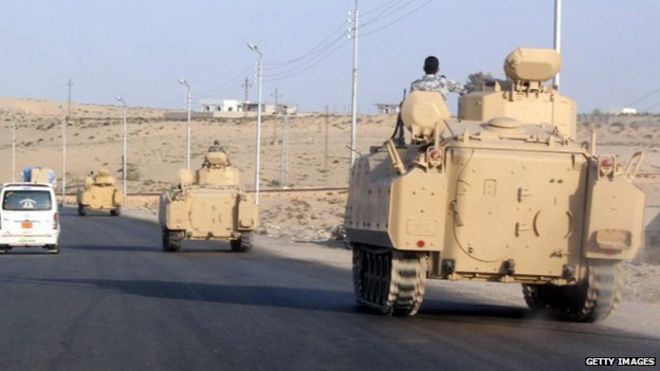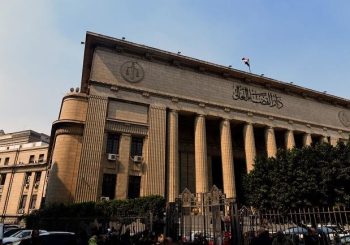The draft anti-terrorism law, which awaits presidential approval to come into effect, imposes an “indefinite, undeclared state of emergency and establishes an exceptional, parallel judiciary,” 17 rights groups said on Tuesday.
“We fear that the state’s strategy for countering violent extremism is only exacerbating it and relies on blocking legitimate outlets for the expression of opinion,” the civil society groups said in a joint statement.
The controversial law was approved by the Cabinet in a meeting on July 1, a day marred by deadly violence in North Sinai, after militants launched a failed attempt to take over a town.
Attacks on that day claimed the lives of at least 17 army personnel, according to military figures, marking a new escalation against Egypt’s security forces.
The law’s approval came one day after President Abdel Fattah al-Sisi vowed to amend laws, saying the hand of “prompt justice” is “tied” with laws, but “we will work on amending the law to achieve justice.”
THE DEFINITION OF TERRORISM
The rights groups insist that they completely reject “violent extremism” but add that the law itself uses “vague” and “ill-defined” terms, when it comes to the definition of the terrorist act.
Article 1 of the proposed law defines a terrorist act in expansive terms but the definition includes the use of force, threats or intimidation with the purpose of “disturbing public order” or putting society’s safety, interests or security at risk.
The list goes on to include harming “national unity” and “social peace.”
The same article states that a terrorist act is “any conduct” carried out to achieve one of the aforementioned purposes.
The rights groups believe this reflects the “desire to expand the definition of terrorist acts to include ‘any conduct,'” even conduct that is not violent.
Under this premise, partaking in a protest or writing an article may be considered a “terrorist act” if the state finds that it harms its national security, the joint statement said.
EXCEPTIONS UNDER THE PROPOSED LAW
The Egyptian cabinet said last week after approving the proposed law, that it achieves “swift and just deterrence”.
Article 51 of this laws allows appealing verdicts in terror crimes within 40 days, reducing the period by 20 days.
“This is yet another infringement of the right to defense,” the joint statement read.
The rights groups highlighted that Egypt’s Code of Criminal Procedures gives judges a month before they submit the details behind a ruling. This gives defendants 10 days to file for appeal.
The proposed law also cancels a stage of litigation. Article 52 allows cases to be appealed before the Court of Cassation, only once.
As per the anti-terrorism draft law the president may take the “necessary procedures to preserve security and public order” when there is a risk associated with terrorism.
These procedures may include evacuation, isolation or imposing a curfew on some regions, provided that the president’s decision specifies the region and that the decision does not last for longer than six months.
In urgent cases, the measures may be taken upon verbal orders from the president. These orders must be “reinforced” through writing within 8 days.
MEDIA FREEDOMS
Additionally, the rights groups touched upon the law’s potential impact on media and press freedoms, adding to critcism already launched by Egypt’s press syndicate, which has cited “dangerous articles” in the draft law.
The civil society organisations said the law’s “flawed definition of terrorist acts” can be applied to advocacy organisations or newspapers and websites.
The proposed law considers the transfer, possession and collection of data and information, using whatever means including electronic and digital, as one of the ways to finance terrorism. This applies if the purpose is to use all or some of the information in committing a terrorist act.
Article 33 punishes by a minimum of two years in prison the publishing of “false news or data” which contradict official data on “terrorist operations”. The rights groups believe it is “wholly unprecedented” and “restricts the freedom of journalists”.
However, Egypt’s Transitional Justice Minister Ibrahim al-Heneidi said Article 33 would come into effect only if four conditions are met: if the case is related to “terrorism”, if it is deliberate, if it involves publishing false news, and if such news contradicts official data.
Meanwhile, Article 26 of the draft legislation stipulates that any “terrorist crime” committed in saying, writing or any other means is punishable by a minimum of five years in prison.
Article 27, similarly, punishes by a minimum of five years the creation or use of a website to promote ideas or beliefs which call for committing “terrorist acts” or to mislead security authorities, among other uses.
Heneidi called on the syndicate to submit to the government its recommendations regarding the draft law, in statements to reporters on Monday.
The signatories, which include the Cairo Institute for Human Rights Studies, Egyptian Initiative for Personal Rights and Alhaqaneya Centre for Law renewed their calls for comprehensive and inclusive dialogue to devise a serious and effective plan to face the root causes of extremism.
“The proposed law makes us fear for the collapse of the state itself,” they said.






Comment (1)
[…] Anti-Terrorism Law Widely Rejected by Egyptian Human Rights Groups – “We fear that the state’s strategy for countering violent extremism is only exacerbating it and relies on blocking legitimate outlets for the expression of opinion,” the civil society groups said in a joint statement. The … […]